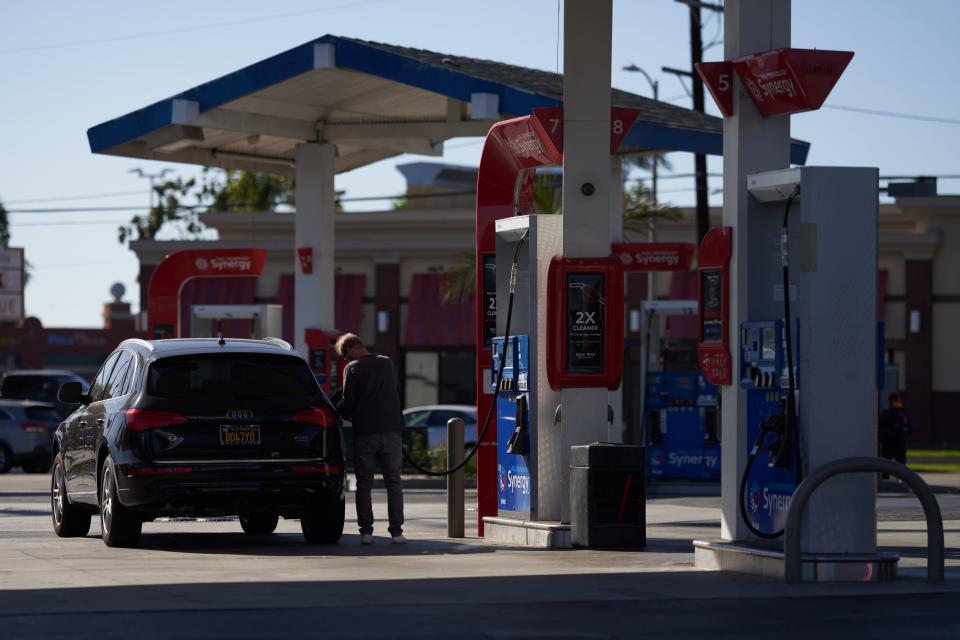House passes Strategic Production Response Act in GOP effort to limit oil reserve withdrawal
- Oops!Something went wrong.Please try again later.
WASHINGTON – The House Friday passed legislation that would limit President Joe Biden's ability to withdraw oil from the Strategic Petroleum Reserve after Republicans accused him of misusing his authority to lower gas prices ahead of the midterm elections.
The Strategic Petroleum Response Act would prevent any administration from withdrawing oil from the reserves unless there is an increase in the percentage of federal lands that produce oil and gas that match the percentage withdrawn. Expanding energy exploration on public lands has been a top priority for GOP lawmakers .
It passed in the House by a vote of 221-205 on an almost entirely party-line vote. The bill won't become law because it lacks the votes to pass in the Democratic-controlled Senate and the Biden administration has said it would veto it in any case.
Republicans argue tapping into the reserve should only be used for emergency purposes. The GOP introduced the bill following Biden's order last year of the largest withdrawal from the reserves in U.S. history of the reserves that plummeted its levels.
Smart analysis delivered to your inbox: Sign up for the OnPolitics newsletter
Where are the US strategic oil reserves? Here's how many barrels remain and where they are
Russian invasion of Ukraine prompted Biden to tap reserves
Biden ordered the withdrawal of 180 million gallons of oil from the emergency reserves last year when Russian sanctions and the war in Ukraine affected the global oil supply and raised prices to historic highs.
The Biden administration has criticized the proposed legislation, with Energy Secretary Jennifer Granholm saying the bill will weaken the reserve's usefulness as a tool to ensure energy security.
Restrictions on Atlantic leasing among amendments adopted
Under a new House rule designed to give rank-and-file members more power to shape legislation, lawmakers of both parties are now able to propose amendments to most bills that reach the floor.
The House debated and voted on numerous amendments to the bill over a two-day period.
One amendment that passed, offered by Rep. Nancy Mace, R-S.C., would restrict oil and gas leasing near southern Atlantic states such as tourist-dependent South Carolina. Another, offered by Rep. Josh Gottheimer, D-N.J., would prohibit petroleum reserve sales that would benefit other countries "owned, controlled, or under the influence of" China, North Korea, Russia or Iran.
The House passed similar legislation earlier this month with a bipartisan vote that prohibits the sale and export of oil from the federal reserves to China.
What is the strategic petroleum reserve?
The strategic petroleum reserve is the world's largest supply of emergency crude oil that is federally owned and stored in underground caverns at sites around the Gulf of Mexico.
According to the Department of Energy, the reserve is a "significant deterrent to oil import cutoffs and a key tool in foreign policy."
Administrations from both parties have withdrawn oil from the reserves throughout the last few decades. Prior to Biden's withdrawal last year, Energy Secretary Steven Chu, under former President Barack Obama, was the last to withdraw oil from the reserve in 2011 to offset supply disruptions from unrest in Libya.
Why does the GOP want to limit Biden's authority?

Republicans say the legislation will discourage politically motivated use of the petroleum reserve for non-emergency purposes and will reduce gas prices by increasing the land available for oil and gas production, according to the House Energy and Commerce Committee.
Republicans have also said Biden's large withdrawal from the reserve has compromised national security by depleting the available oil.
"The Strategic Petroleum Reserve is there in case of emergencies, and shouldn't be used as a political prop," Rep. John Joyce, R-Pa., who co-sponsored the bill, tweeted. "It's time to prevent the Biden Administration from using our reserves for non-emergency reasons without establishing a plan to increase oil and gas production here at home."
Do withdrawals from the oil reserve affect gas prices?

The Biden administration credits withdrawals from the reserve to lowering gas prices. The Department of Energy estimated Biden's withdrawal from the reserve lowered gas prices by 40 cents per gallon last summer and announced in December the agency has begun purchasing oil to replenish what was withdrawn last year.
Secretary Granholm said unnecessary restrictions on when the reserve can be used could result in prices rising.
"It would potentially delay allowing oil to be released for domestic emergencies following a natural disaster or a pipeline outage at home, leaving, again, prices at risk of rising during — in the wake of a market shock because of emergencies due to extreme weather events," she said during a White House briefing.
Republicans feel differently, blaming Biden for current above-average gas prices combined with a drained petroleum reserve.
"The administration, especially leading up to the election, depleted our reserve for political purposes and I believe that it is important that they are transparent, and we are holding them accountable for that," the bill's sponsor, Rep. Cathy McMorris Rodgers, R-Wash., said on CNBC.
This article originally appeared on USA TODAY: Republican-backed bill hopes to limit Biden authority over oil reserve

